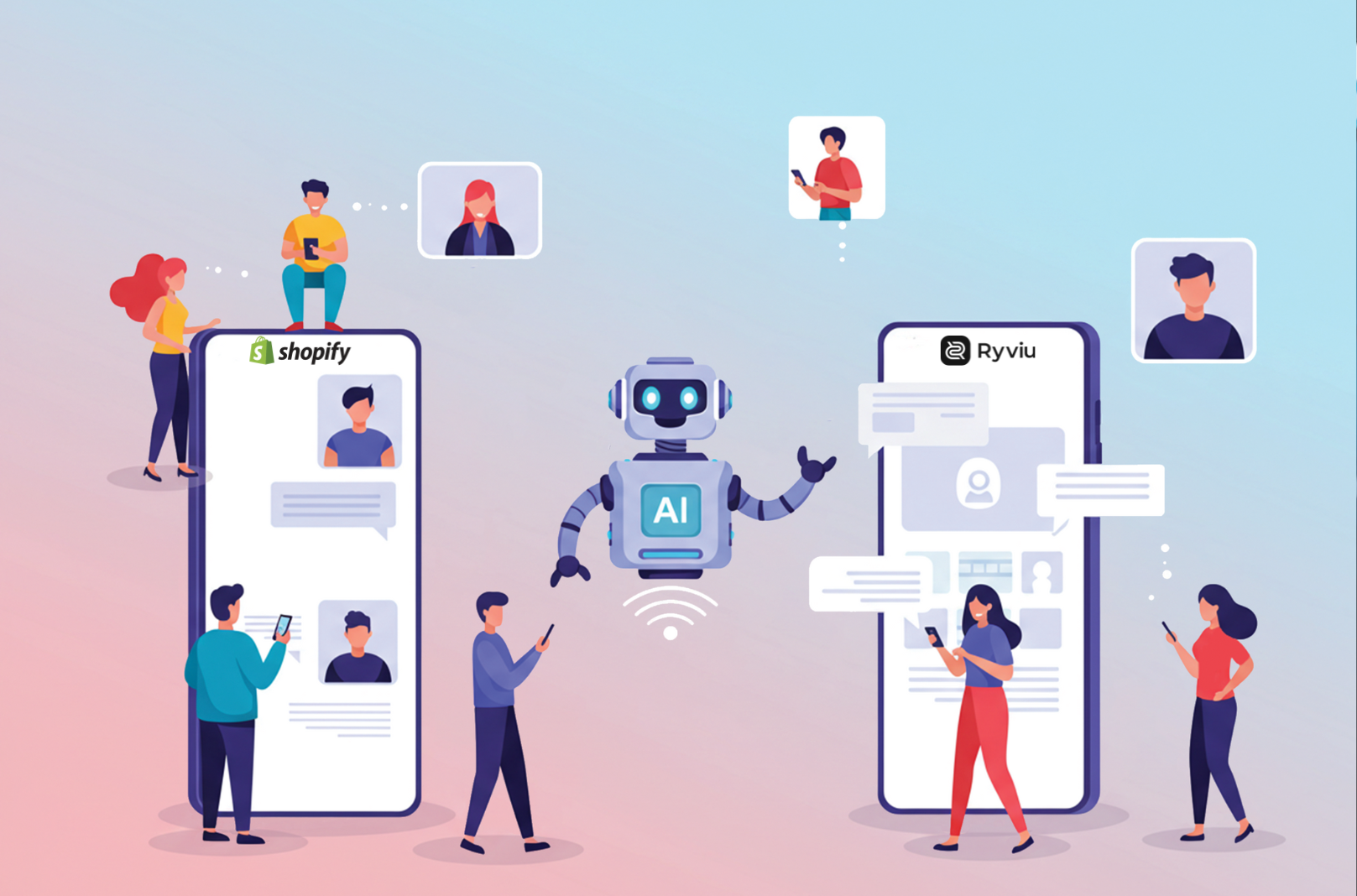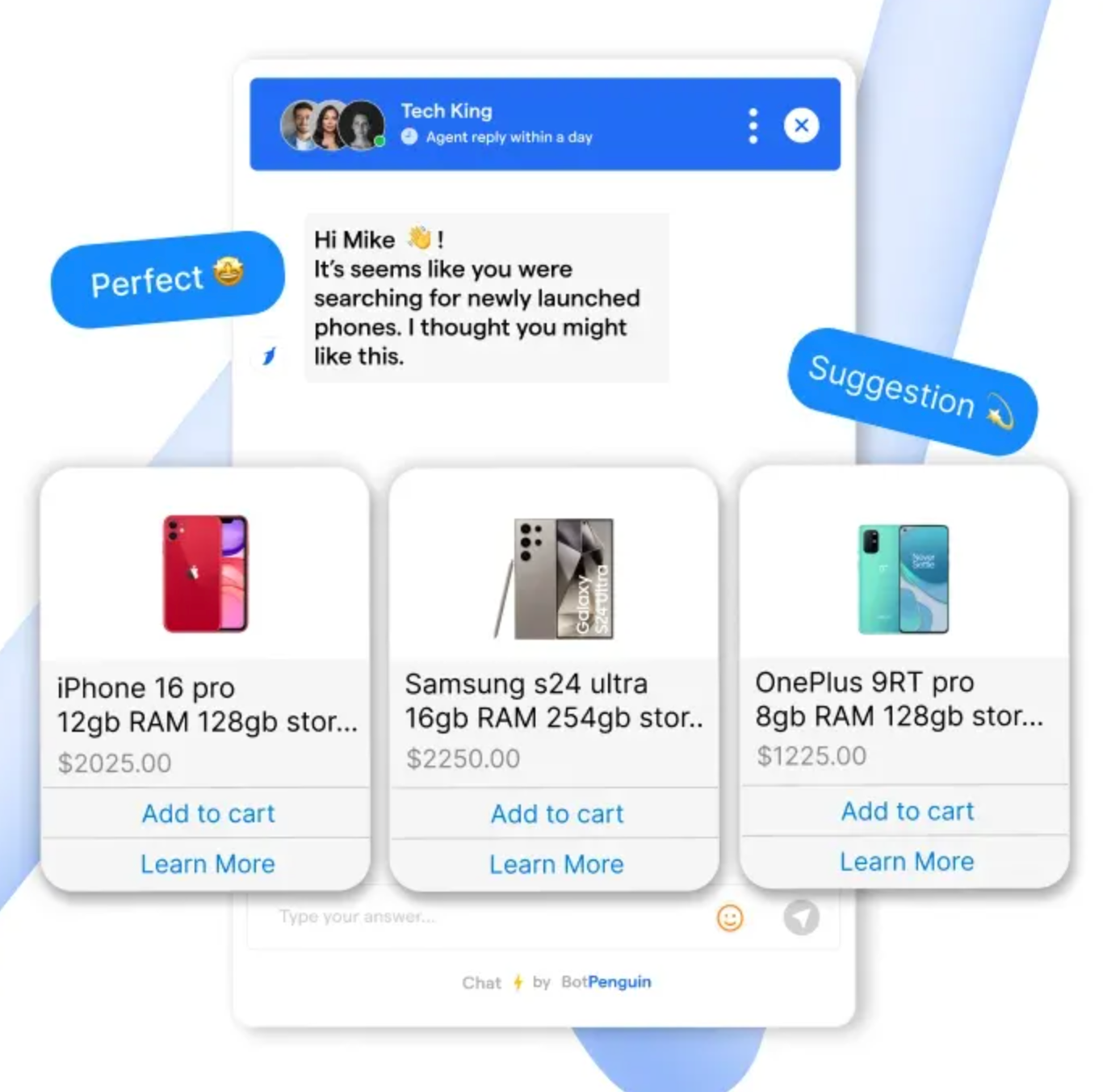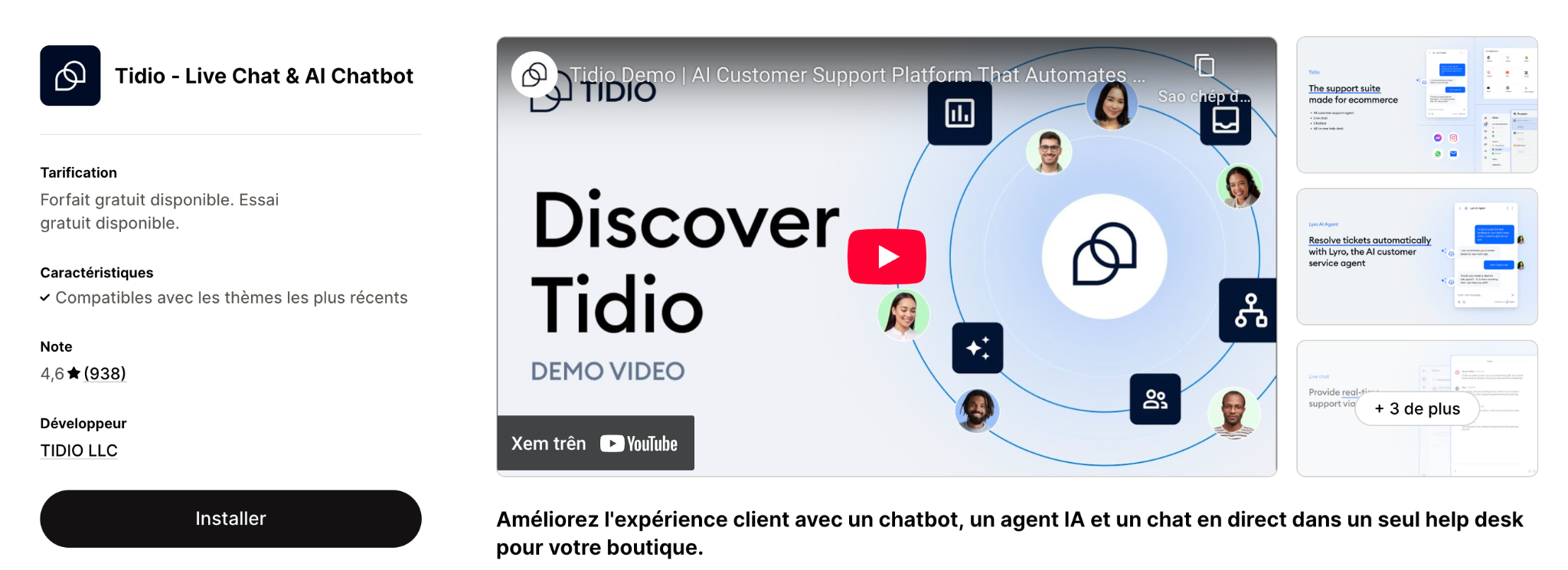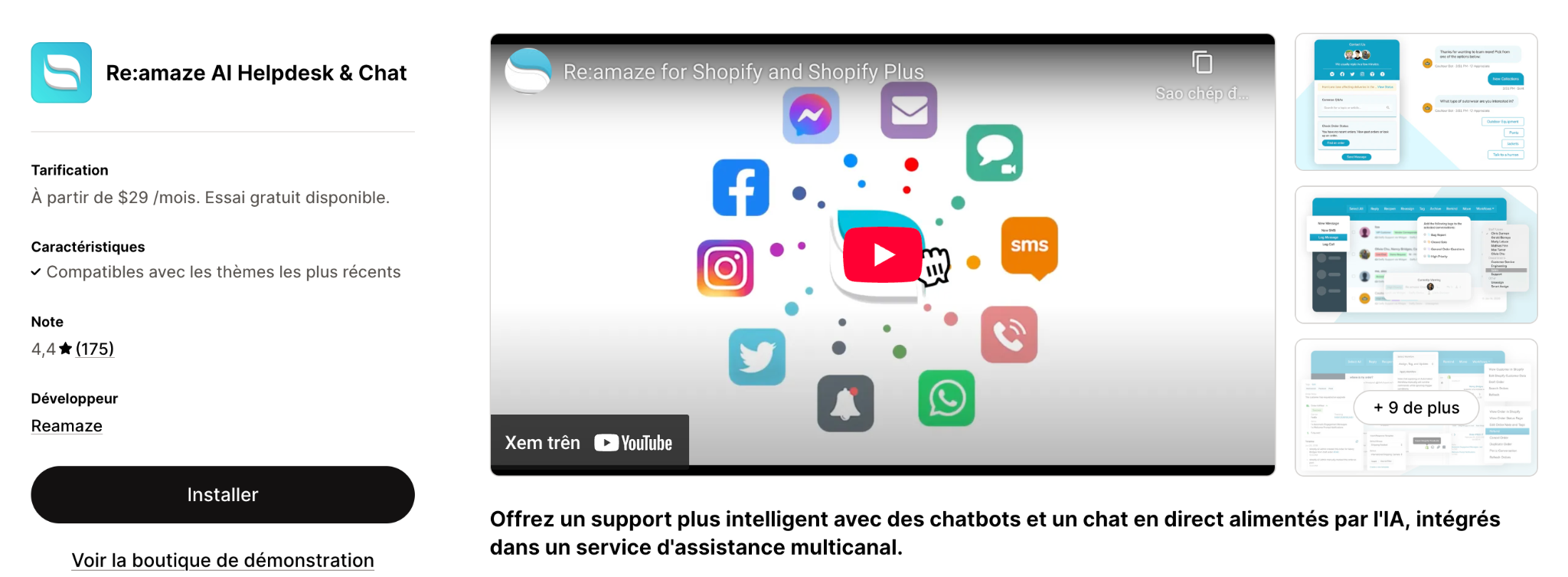
Running a Shopify store can feel overwhelming. Between managing products, engaging customers, handling questions, and closing sales, it’s easy to miss opportunities. Modern shoppers expect speed, personalization, and convenience, and if they don’t get it, they move on to competitors.
This is where AI chatbots step in. They’re not just customer service assistants anymore but they’re powerful tools for boosting sales, reducing cart abandonment, and building loyalty. Unlike traditional live chat that requires constant monitoring, AI chatbots are available 24/7, learn from customer interactions, and can guide shoppers from discovery to checkout.
In this article, we’ll break down why AI chatbots matter for Shopify merchants, how they increase sales and improve support, best practices for using them effectively, and the best chatbot apps you can integrate into your store.
Online shoppers have little patience for slow responses, especially when they’re ready to buy. If they can’t get an answer to a simple question like shipping options or return policies, they’re more likely to leave the store. AI chatbots make sure that never happens by providing instant answers, day or night. Instead of waiting for a human agent, customers get the information they need right away. This quick support often prevents abandoned carts and keeps sales moving forward.
A great shopping experience feels tailored to each person, and chatbots can help create that effect. They analyze browsing history, items in the cart, or past purchases to recommend products that actually make sense. For example, someone buying a new pair of running shoes might get a suggestion for performance socks or a water bottle. These little touches make customers feel understood, not just sold to. Over time, personalization builds stronger trust and increases repeat purchases.
As your Shopify store grows, so does the number of customer questions—and it’s nearly impossible for a small team to keep up. Chatbots solve this by managing unlimited conversations at once without losing speed or accuracy. During busy times like holiday sales, they make sure every shopper gets a response, no matter how many are online. This frees up human agents to focus only on the complex cases that need personal attention. The result is a smoother operation for you and a better experience for your customers.
Cart abandonment is one of the biggest hurdles in eCommerce, with many shoppers leaving right before checkout. Often, this happens because of small uncertainties, like shipping costs, delivery times, or discount availability. A chatbot can step in at this exact moment and offer timely reassurance.
For instance, if a customer hesitates at checkout, the chatbot might remind them about free shipping or offer a limited-time discount code. This type of nudge feels conversational rather than pushy, which helps reduce friction. Since the chatbot is active 24/7, it can catch these moments even when no staff is available. Over time, this proactive support adds up to fewer abandoned carts and more completed purchases.
Shoppers often don’t know what else might go well with the product they’re browsing, and this is where a chatbot can add real value. By analyzing browsing history, cart contents, and purchase behavior, it can suggest items that naturally complement a customer’s choice.

For example, a customer buying a camera might be shown options for tripods, memory cards, or lens cleaning kits. Because the suggestion comes through a friendly chat, it feels more like helpful advice than a sales tactic. This kind of recommendation increases average order value while also improving the shopping experience. Customers appreciate when a store anticipates their needs, and chatbots make that kind of personalized service scalable. With each relevant recommendation, shoppers see your store as more reliable and thoughtful.
Not every visitor is ready to make a purchase right away, but many are open to leaving their information for future offers. Chatbots can gently start conversations by asking a few questions to learn more about the shopper’s needs.
Let’s take an example. Someone browsing jewelry might be asked if they’re shopping for themselves or looking for a gift. Based on the response, the chatbot can guide them to the right products or suggest joining a mailing list for exclusive designs. This approach feels more personal than a static popup and usually gets higher engagement. By gathering these details conversationally, you build a stronger list of qualified leads without interrupting the browsing experience. Over time, these leads can be nurtured into loyal customers through targeted campaigns.
Chatbots aren’t just helpful during a purchase, but they can also strengthen loyalty afterward. When integrated with a rewards program or loyalty apps like Reton, the chatbot can remind customers about points they’ve earned or rewards they can redeem.
Imagine a shopper adding items to their cart and the chatbot saying, “You have enough points for a $10 discount. Do you want to apply now?” That simple reminder often turns an undecided shopper into a confirmed buyer. It also encourages repeat purchases because customers see the value of staying engaged with your store. Since everything happens automatically, you don’t need to manually track or remind people about their rewards. Over time, this turns your chatbot into a key player in building long-term customer relationships.
A large percentage of support requests are repetitive questions, things like return policies, shipping times, or product availability. Chatbots are perfect for handling these because they can provide clear, instant answers without delay. This saves customers from having to search through pages of policies or wait for an email response.
For example, a shopper wondering about international shipping can get the answer in seconds from a chatbot, instead of waiting overnight for a reply. The immediacy builds trust and shows customers that your store respects their time. It also frees up human agents to focus on solving more complex or sensitive issues. As a result, both customers and support teams benefit from faster, smoother interactions.
Because chatbots handle so many of the common questions automatically, your support inbox doesn’t get overwhelmed. This makes life easier for your team and creates a faster experience for customers who really do need human help.
For instance, a fashion store may receive hundreds of questions daily about return windows. With a chatbot answering those instantly, your staff can concentrate on special cases like damaged orders or sizing issues. This efficiency not only reduces costs but also improves overall service quality. Customers don’t feel brushed aside because their questions are being resolved quickly. And your support team feels less burned out because they’re not stuck answering the same queries again and again.
Selling internationally is a huge opportunity, but language can be a barrier. AI chatbots that support multiple languages make it easy for stores to serve customers around the world. If someone visits your site from France and gets immediate help in French, it creates a sense of comfort and trust. They don’t need to translate product descriptions or struggle with English, which can often discourage purchases.
This capability helps smaller brands look professional and accessible on a global scale. It also opens the door to expanding into new markets without having to hire full-time multilingual staff. For many Shopify merchants, multilingual chatbots make international growth far more achievable.
Even the smartest chatbot can’t handle every situation, and that’s okay, as long as it knows when to hand things over. The best chatbots recognize when a query is too complex or sensitive and smoothly transfer the conversation to a human agent. This way, the customer doesn’t feel abandoned or forced to repeat themselves.
For example, if a shopper complains about a defective product, the bot can collect order details and then connect them to a live agent for resolution. The transition feels natural and keeps the conversation flowing. This balance between automation and human support creates a trustworthy system where customers feel supported at all times. Ultimately, it makes chatbots a helpful extension of your team rather than a replacement.
Let’s follow the best practices to make AI chatbots more useful in your Shopify store.
Customers dislike robotic interactions, so it’s important to give your chatbot a natural and conversational voice. Design scripts that feel friendly, empathetic, and approachable, rather than overly formal or stiff. Small touches like emojis, casual phrasing, or even humor can make conversations feel more engaging and less transactional. When your chatbot mirrors a human-like personality, customers are more likely to trust it and continue the interaction.
Your chatbot should not work in isolation and it becomes more powerful when integrated with other tools in your Shopify ecosystem. For example, connecting it with loyalty apps like Reton allows bots to remind shoppers of points or rewards during checkout. You can also sync it with CRMs or email platforms to create a smooth flow from browsing to purchase to post-sale follow-up. This integration ensures customers experience a unified journey, whether they’re chatting with a bot or interacting with other touchpoints.
Every chatbot conversation holds valuable insights into customer behavior and pain points. By studying data on FAQs, drop-off points, and customer frustrations, you can make improvements to product descriptions, support content, and store design. For instance, if many customers ask about shipping times, you might highlight that information more clearly on product pages. Regular analysis ensures your chatbot not only solves problems in real-time but also helps you improve your store long-term.
A chatbot should never be a “set it and forget it” tool and it needs ongoing optimization to remain effective. Regularly test conversation flows to identify confusing paths, add new FAQs as your store grows, and refine scripts for clarity. Updating chatbot responses for seasonal promotions like Black Friday or holiday sales ensures relevance and timeliness. The more you adapt and refine, the more your chatbot will align with customer expectations and drive sales.
While automation saves time and streamlines support, customers still appreciate speaking with a real person when issues get complex. A good practice is to set triggers for when a human agent should step in, such as high-value customers, unresolved complaints, or refund requests. This balance ensures your store provides efficiency without sacrificing empathy. By combining the speed of AI with the warmth of human support, you create a trustworthy and customer-friendly experience.

Pricing: Free plan available; paid plans start at $29/month.
Tidio is one of the most popular chatbot apps for Shopify because it blends live chat and AI-powered automation in one platform. It’s designed for small to medium-sized stores that need to offer real-time customer service without hiring large teams. With Tidio, merchants can handle conversations across multiple channels while the chatbot takes care of routine questions and cart recovery.
Key Features:

Pricing: Starts at $10/month, scales with usage.
Gorgias is best known as a customer support help desk, but its automation features are a game-changer for busy Shopify merchants. Instead of manually answering repetitive questions, the AI chatbot takes care of them and reduces the overall ticket volume. It’s especially useful for stores that want one platform to manage customer service across email, live chat, and social media.
Key Features:

Pricing: Starts at $29/month per team member.
Re:amaze is a customer messaging platform that combines live chat, chatbot automation, and a shared team inbox. It’s a great option for stores that want both customer support and marketing features in one tool. With Re:amaze, you can automate repetitive workflows, engage visitors with proactive messages, and manage all communication in a single place.
Key Features:
AI chatbots are no longer optional. They’re also essential for growing Shopify stores. They provide instant, personalized, and scalable support, while also playing a direct role in boosting sales. By reducing cart abandonment, offering recommendations, and reminding customers about loyalty rewards, they transform casual visitors into loyal buyers.
If you’re running a Shopify store and haven’t integrated an AI chatbot yet, now is the perfect time. Your customers are waiting, and your sales are too.


This article explores why variant-level reviews matter, the challenges merchants face, and the best practices for implementing them effectively without harming performance or user experience.
Shopify app stack optimization is the process of reviewing, refining, and streamlining the apps installed on your store so each one delivers clear value without compromising speed. By focusing on intentional app selection and ongoing optimization, merchants can create faster, more reliable shopping experiences that scale smoothly as the business grows.